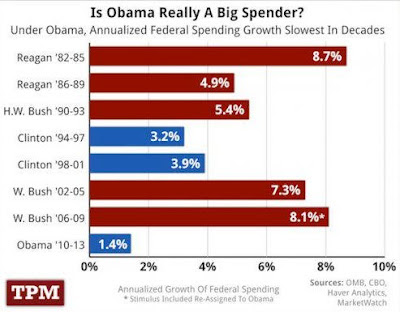It's good to refute Obama's Republican critics when they accuse Obama of being a big spender, but it's not enough. In an alternate universe, say the Bizarro World, where facts would matter in election campaigns and political discussion, Obama's relative thrift would be embarrassing to the Democrats, as it should be. After a catastrophe like the 2008 crash, the government needs to pump lots of money into the economy to increase demand. Far from cutting government jobs as Obama has, the administration should add more. Obama's stimulus bill was the right idea, but inadequate thanks in part to Obama's pre-emptive surrender to the Republicans on the Bush-era tax holiday for the rich.
Which gives me the chance I've been looking for to provide a source and a link to something I've mentioned before: Obama's admission that he had failed as a negotiator by offering the tax cuts himself, instead of making the Republicans demand them.
Now in retrospect, I could have told Barack Obama in December of 2009 that if you already have a third of the package as tax cuts, then the Republicans, who traditionally are more comfortable with tax cuts, may just pocket that and attack the other components of the program. And it might have been better for us not to include tax cuts in the original package, let the Republicans insist on the tax cuts, and then say, O.K., you know, we’ll compromise and give you your tax cuts, even though we had already proposed them.As Avedon Carol pointed out, one of the fundamental principles of bargaining is that you ask for more than you want, so the other party will have to make concessions to get you to lower your demand. As I've pointed out before, even if Obama (an alumnus of the supposedly tough Chicago political scene as well as a couple of years in the Senate) had never learned this, he had plenty of advisors with more experience who could have pointed it out at the time. There was no need for the far-future Obama of 2010 to invent a time machine so he could advise his much-younger 2009 self in the basics of political rough-and-tumble. This same pattern has been played out repeatedly in Obama's term, as when he tried to show his reasonableness by appointing two fanatical deficit hawks to run his deficit-reduction commission, and when he put cuts in Social Security and Medicare benefits on the table during the absurdly mismanaged debt-ceiling debacle. To say nothing of putting off that fight until the Democrats no longer controlled the House of Representatives -- was that "I can beat them mugs with one hand tied behind my back" bravado? I wouldn't be surprised.
And if you recall, when we initially unveiled what the Recovery Act would look like — in fact, that a third of it was tax cuts — Mitch McConnell actually was, as he phrased it, pleasantly surprised that sort of traditional Republican idea had been included. But very quickly that pleasant surprise turned into attacks on the infrastructure or the aid to the states or what have you.
And you know, this isn't a "Gotcha!" kind of criticism: the US economy is still stagnant except for the rich (including President Obama, who will never have to stand in an unemployment line nor will his family ever miss a meal). Real people are suffering because of the incompetence of the Obama administration, and his smug dismissals of his "professional left" critics are the more despicable because of that. This should be remembered when Democratic loyalists talk about the stupidity of the voters, who don't understand how politics works and should just sit back and let the experts drive. Far from playing a genius-level game of eleven-dimensional chess with his opponents, Obama can't even play normal two-dimensional chess.
Obama's supporters are worthy of their President. Does Dinesh D'Souza accuse him of being a Kenyan anti-colonialist? They retort that the President is following boldly in the steps of the "original anticolonialists," the Founding Fathers -- who in reality were exemplary colonialists. D'Souza accuses Obama of rejecting American exceptionalism? His defenders reply that he accepts it, with all the aggression and bloodshed that entails. Do the Republicans claim that Obama is weak on foreign policy and defense? His defenders brandish Bin Laden's head on a pike, and the corpses of dead "militants." Do the Republicans accuse him of reckless spending? Au contraire, the President is a miser, the biggest cheapskate to occupy the White House since Jimmy Carter turned down the air conditioning and ordered lights to be turned off. Not that I blame them: there but for the lack of Barack's grace go I.
Ironically, the logical conclusion to draw from the graph above is that we need to elect a big-spending Republican president in Obama's place. That's not a good idea either, since Republican spending is aimed at the neediest of the top 1% of the wealthy, which doesn't increase demand; the Bush years aren't far enough behind us that any adult should have forgotten that. It wasn't out-of-control spending or soaring deficits that brought on the crash of 2008, it was unregulated financial speculation, which continues to the present. Why should the wealthy worry? If they get into trouble, the government will bail them out. But the really rich aren't hurt by depressions, and despite their constant poor-mouthing, the rich are doing quite well under Obama. Profits are up. It's the rest of us who aren't fit to eat with the hogs at the corporate trough.

